AWM41 1024 - [Nurses Narratives] Sister Pierre-Humbert - Part 1
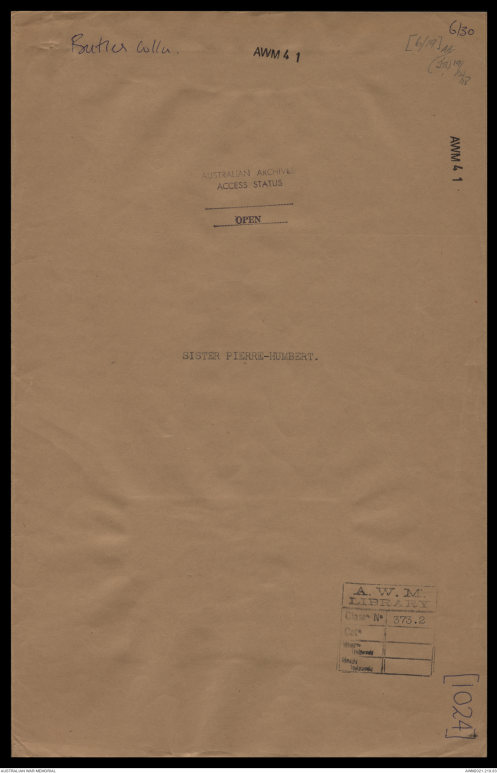
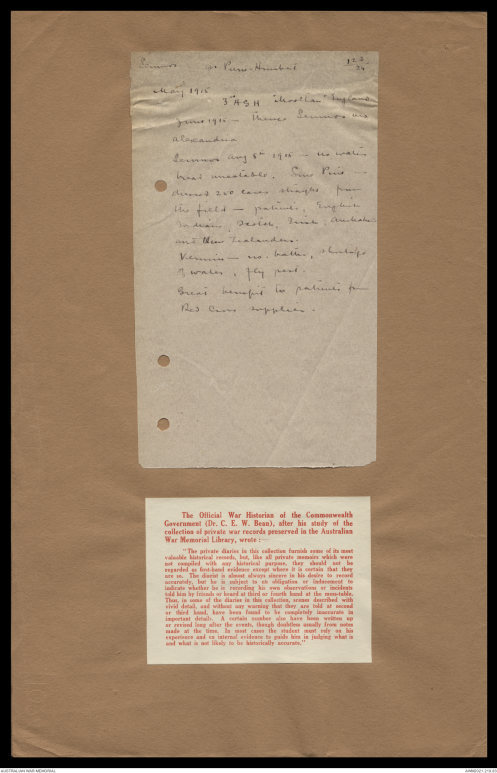
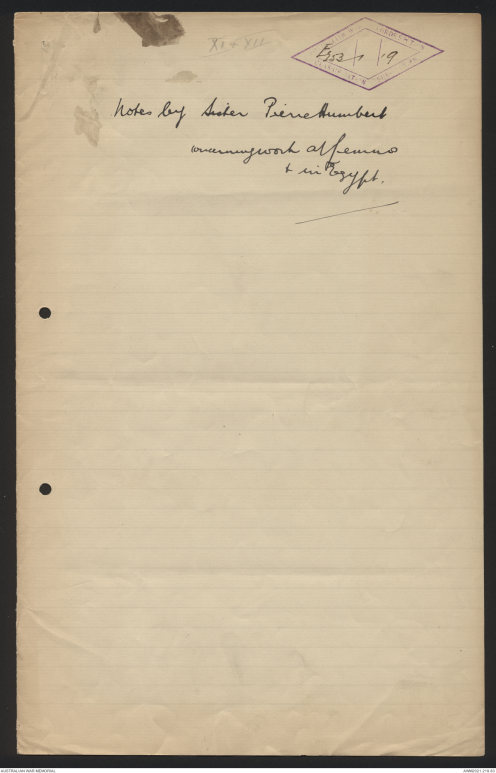
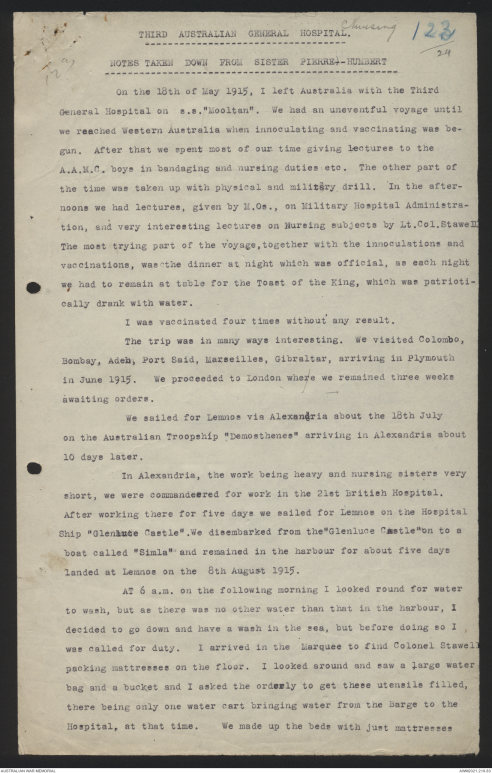
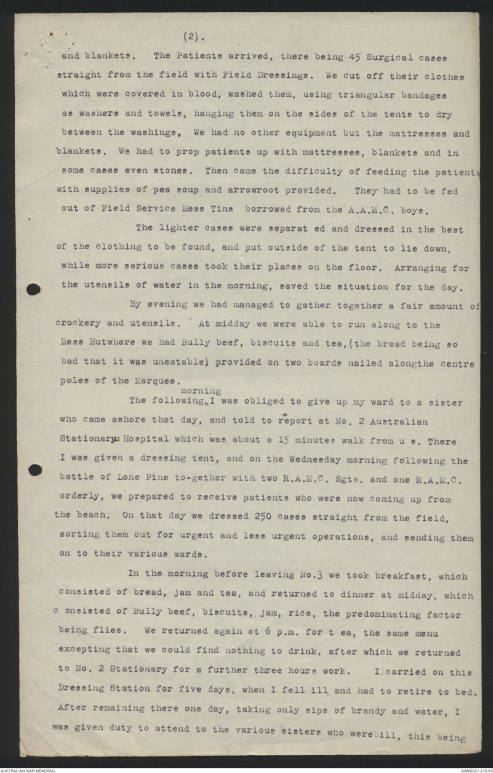
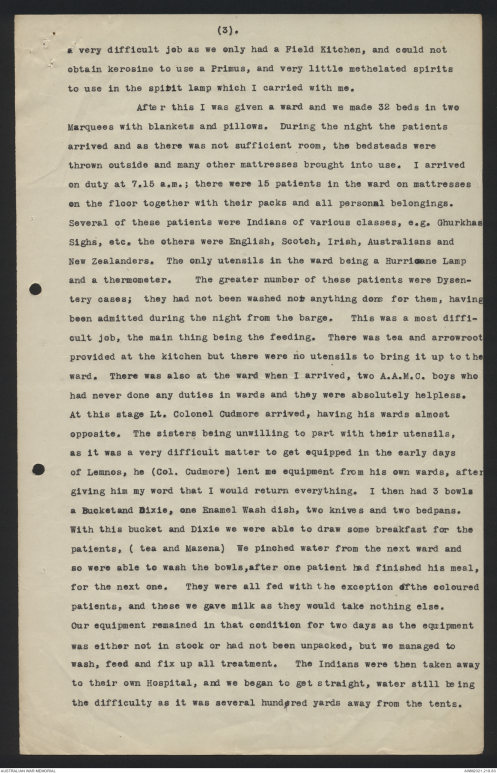
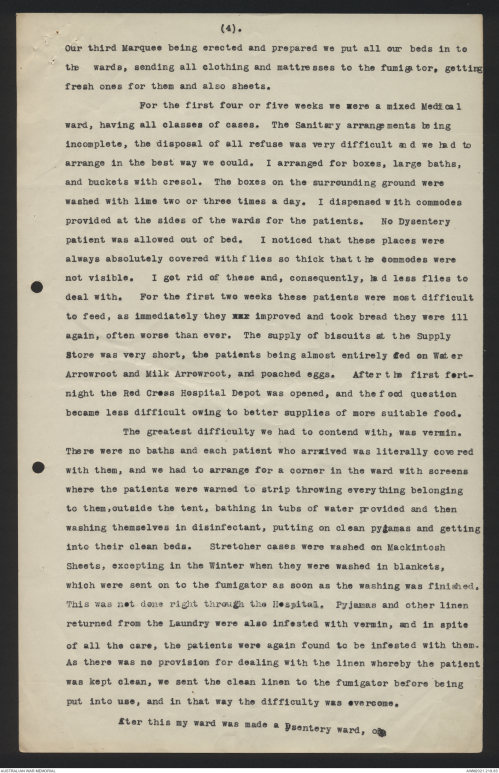
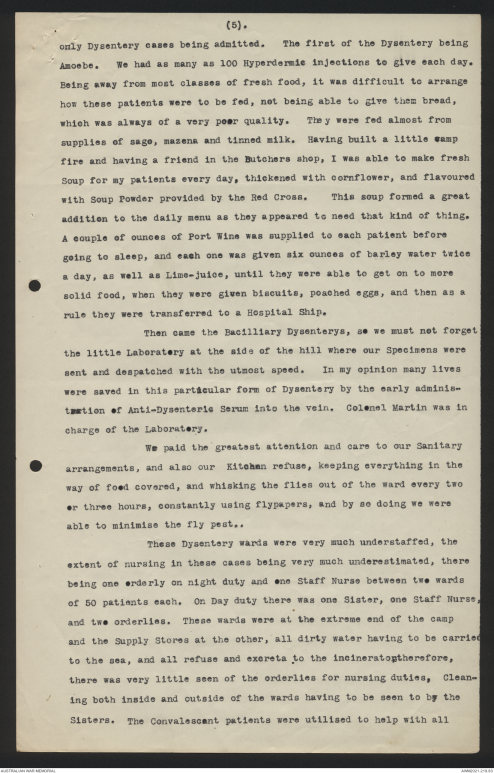
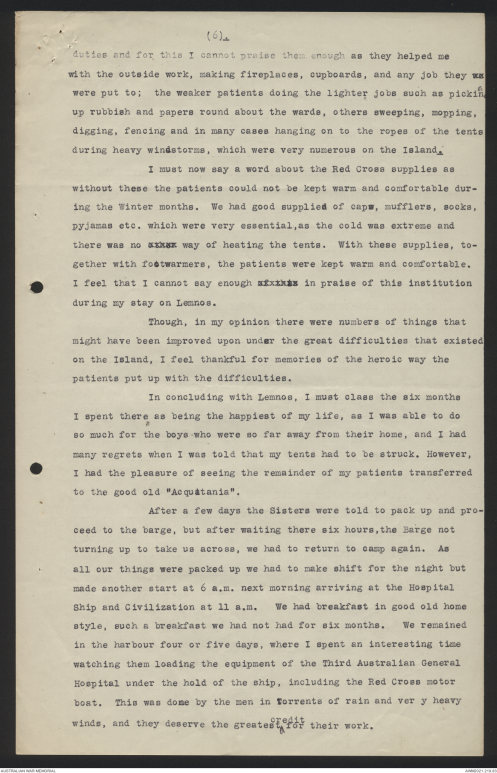
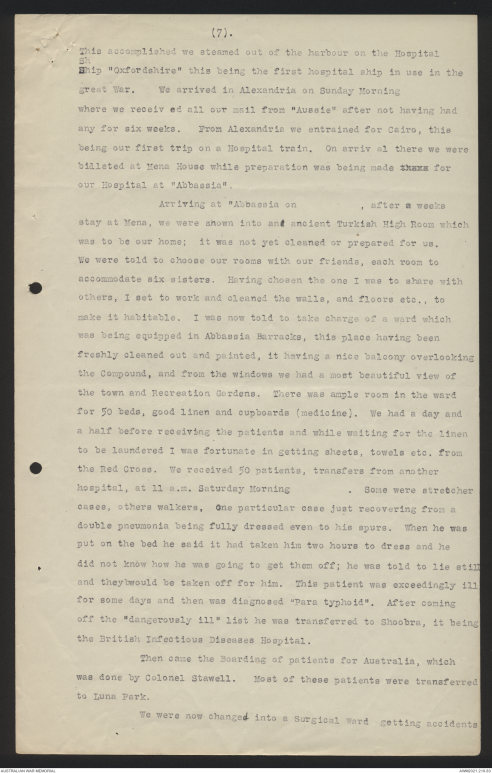
Butler Colln.
AWM41
6/30
[6/19]
[[?]];
AWM41
AUSTRALIAN ARCHIVE
ACCESS STATUS
OPEN
SISTER PIERRE-HUMBERT.
A. W. M.
LIBRARY
[1024]
[[Claim]] No. 373.2
1123/24
Letters Sr Piere-Humbert
May 1915
3rd AGH “Australian” England
June 1915 – France Lemnos and
Alexandria
Lemnos Aug 5th 1915 – us waters
broad immediate. Lone Pine -
received 250 cases straight from
the field – patients, Englishmen, Indians, Scottish, Irish, Australians
and New Zealanders.
[[Ver??]] no baths, shortage of water. Fly pest.
Great breakfast for patients from
Red Cross supplies.
The Official War Histories of the
Commonwealth Government (Dr. C. E. W. Bean), after his study of the collection of private war records preserved in the Australian War Memorial Library, wrote :- "The private diaries in this collection furnish some of its most valuable historical records, but like all private memoirs which were not compiled with any historical purpose, they should not be regarded as first-hand evidence except where it is certain that they are so. The diarist is almost always sincere in his desire to record accurately, but he is subject to no obligation or inducement to indicate whether he is recording his own observation or incidents told him by friends or heard at third or fourth hand heard at the mess table. Thus, in some of the diaries in this collection, scenes described with vivid detail, and without any warning that they are told at second or third hand have been found to be completely inaccurate in important details. A certain number have been written up or reviewed long after the events, though doubtless usually from notes made at the time. In most cases the student must rely on his experience and on internal evidence to guide him in judging what is and what is not likely to be historically accurate."
XI & XII E153/1/19
Notes by Sister Pierre Humbert
covering work at Lemnos & in Egypt
THIRD AUSTRALIAN GENERAL HOSPITAL. [[ Clearing??]] 123/24
NOTES TAKEN DOWN FROM SISTER PIERRE--HUMBERT
On the 18th of May I left Australia with the Third
General Hospital on s.s. "Mooltan". We had an uneventful voyage until we reached Western Australia when innoculating and vaccinating was begun.
After that we spent most of our time giving lecture to the
A.A.M.C. boys in bandaging and nursing duties etc. The other part of
the time was taken up with physical and military drill. In the afternoons,
we had lectures, given by M. Os., on Military Hospital Administration,
and very interesting lectures on Nursing subjects by Lt. Col. Stawe II.
The most trying part of the voyage, together with the innoculations and
vaccinations, was the dinner at night which was official, as each night
we had to remain at table for the Toast of the King, which was patriotically
drank with water.
I was vaccinated four times without any result.
The trip was in many ways interesting. We visited Colombo,
Bombay, Adeh, Port Said, Marseilles, Gibraltar, arriving in Plymouth
in June 1915. We proceeded to London where we remained three weeks
awaiting orders.
We sailed for Lemnos via Alexandria about the 18th July
on the Australian Troopship "Demosthenes" arriving in Alexandria about
10 days later.
In a Alexandria, the work being heavy and nursing sisters very
short, we were commandeered for work in the 21st British Hospital.
After working there for five days we sailed for Lemnos on the Hospital
Ship "Glenlune Castle". We disembarked from the "Glenlune Castle" on to a
boat called "Simla" and remained in the harbour for about five days
landed at Lemnos on the 8th August 1915.
At 6 a.m. on the following morning I looked round for water
to wash, but as there was no other water than that in the harbour, I
decided to go down and have a wash in the sea, but before doing so I was called for duty. I arrived in the Marquee to find Colonel Stawell
packing mattresses on the floor. I looked around and saw a large water
bag and a bucket and I asked the orderly to get these utensils filled,
there being only one water cart bringing water from the Barge to the
Hospital, at that time. We made up the beds with just mattresses
(2).
and blankets. The Patients arrived, there being 45 Surgical cases
straight from the field with Field Dressings. We cut off their clothes
which were covered in blood, washed them, using triangular bandages
as washers and towels, hanging them on the sides of the tents to dry
between the washings, We had no other equipment but the mattresses and
blankets. We had to prop patients up with mattresses, blankets and in
some cases even stones. Then came the difficulty of feed the patients
with supplies of pea soup and arrowroot provided. They had to be fed
out of Field Service Mess Tins borrowed from the A.A.M.C. boys.
The lighter cases were separated and dressed in the best
of the clothing to be found, and put outside of the tent to lie down,
while more serious cases took their places on the floor. Arranging for
the utensils of water in the morning, saved the situation for the day.
By evening we had managed to gather together a fair amount of
crockery and utensils. At midday we were able to run along to the
Mess Hut where we had Bully beef, biscuits and tea, (the bread being so
bad that it was uneatable) provided on two boards nailed along the centre
poles of the Marquee.
The following ^morning, I was obliged to give up my ward to a sister
who came ashore that day, and told to report at No. 2 Australian
Stationary Hospital which was about a 15 minutes walk from us. There
I was given a dressing tent, and on the Wednesday morning following the
battle of Lone Pine to-gether with two R.A.M.C. Sgts. and one R.A.M.C.
orderly, we prepared to receive patients who were now coming up from
the beach. On that day we dressed 250 cases straight from the field,
sorting them out for urgent and less urgent operations, and sending them
on to their various wards.
In the morning before leaving No. 3 we took breakfast, which
consisted of bread, jam and tea, and returned to dinner at midday, which
consisted of Bully beef, biscuits, jam, rice and the predominating factor
being flies. We returned again at 6 p.m. for tea, the same menu
excepting that we could find nothing to drink, after which we returned
to No. 2 Stationary for a further three hours work. I carried on this
Dressing Station for five days, when I fell ill and had to retire to bed.
After remaining there one day, taking only sips of brandy and water, I
was given duty to attend to the various sisters who were ill, this being
(3).
a very difficult job as we only had a Field Kitchen, and could not
obtain kerosine to use a Primus, and very little methelated spirits
to use in the spirit lamp which I carried with me.
After this I was given a ward and we made 32 beds in two
Marquees with blankets and pillows. During the night the patients
arrived and as there was not sufficient room, the bedsteads were
thrown outside and many other mattresses brought into use. I arrived
on duty at 7.15 a.m.; there were 15 patients in the ward on mattresses
on the floor together with their packs and all personal belongings.
Several of these patients were Indians of various classes, e.g. Ghurkhas,
Sighs, etc. the others were English, Scotch, Irish, Australians and
New Zealanders. The only utensils in the ward being Hurricane Lamp
and a thermometer. The greater number of these patients were Dysentery cases; they had not been washed nor anything done for them, having
been admitted during the night from the barge. This was a most difficult
job, the main thing being the feeding. There was tea and arrowroot
provided at the kitchen but there were no utensils to bring it up to the
ward. There was also at the ward when I arrived, two A.A.M.C. boys who
had never done any duties in wards and they were absolutely helpless.
At this stage Lt. Colonel Cudmore arrived, having his wards almost
opposite. The sisters being unwilling to part with their utensils,
as it was a very difficult matter to get equipped in the early days
of Lemnos, he (Col. Cudmore) lent me equipment from his own wards, after
giving him my word that I would return everything. I then had 3 bowls
a Bucket and Dixie, one Enamel Wash dish, two knives and two bedpans.
With this bucket and Dixie we were able to draw some breakfast for the
patients, ( tea and Mazena) We pinched water from the next ward and
so were able to wash the bowls, after one patient had finished his meal,
for the next one. They were all fed with the exception of the coloured
patients, and these we gave milk as they would take nothing else.
Our equipment remained in that condition for two days as the equipment
was either not in stock or had not been unpacked, but we managed to
wash, feed and fix up all treatment. The Indians were then taken away
to their own Hospital, and we began to get straight, water still being
the difficulty as it was several hundred yards away from the tents.
(4).
Our third Marquee being erected and prepared we put all our beds in to
the wards, sending all clothing and mattresses to the fumigator, getting
fresh ones for them and also sheets.
For the first four or five weeks we were a mixed Medical
ward, having all classes of cases. The Sanitary arrangements being
incomplete, the disposal of all refuse was very difficulty and we had to
arrange in the best way we could. I arranged for boxes, large baths,
and buckets with cresol. The boxes on the surrounding ground were
washed with lime two or three times a day. I dispensed with commodes
provided at the sides of the wards for the patients. No Dysentery
patient was allowed out of bed. I noticed that these places were
always absolutely covered with flies so thick that the commodes were
not visible. I got rid of these and, consequently, had less flies to
deal with. For the first two weeks these patients were most difficult
to feed, as immediately they xxx improved and took bread they were ill
again, often worse than ever. The supply of biscuits at the Supply
Store was very short, the patient being almost entirely fed on Water
Arrowroot and Milk Arrowroot, and poached eggs. After the first fortnight the Red Cross Hospital Depot was opened, and the food question
became less difficult owing to better supplies of more suitable food.
The greatest difficulty we had to contend with, was vermin.
There were no baths and each patient who arrived was literally covered
with them, and we had to arrange for a corner in the ward with screens
where the patients were warned to strip throwing everything belonging
to them, outside the tent, bathing in tubs of water provided and then
washing themselves in disinfectant, putting on clean pyjamas and getting
into their clean beds. Stretcher cases were washed on Mackintosh
Sheets, excepting in the Winter when they were washed in blankets,
which were sent on to the fumigator as soon as the washing was finished.
This was not done right through the Hospital. Pyjamas and other linen
returned from the Laundry were also infested with vermin, and in spite
of all the care, the patients were again found to be infested with them.
As there was no provision for dealing with the linen whereby the patient
was kept clean, we sent the clean linen to the fumigator before being
put into use, and in that way the difficulty was overcome.
After this my ward was made a Dysentery ward, ox
(5).
only Dysentery cases being admitted. The first of the Dysentery being
Amoebe. We had as many as 100 Hyperdermic injections to give each day.
Being away from most classes of fresh food, it was difficult to arrange
how these patients were to be fed, not being able to give them bread,
which was always of a very poor quality. They were fed almost from
supplies of sage, masena and tinned milk. Having built a little camp
fire and having a friend in the Butchers shop, I was able to make fresh
Soup for my patients every day, thickened with cornflower, and flavoured
with Soup Powder provided by the Red Cross. This soup formed a great
addition to the daily menu as they appeared to need that kind of thing.
A couple of ounces of Port Wine was supplied to each patient before
going to sleep, and each one was given six ounces of barley water twice
a day, as well as Lime-juice, until they were able to get on to more
solid food, when they were given biscuits, poached eggs, and then as a
rule they were transferred to a Hospital Ship.
Then came the Bacilliary Dysenterys, so we must not forget
the little Laboratory at the side of the hill where our Specimen were
sent and despatched with the utmost speed. In my opinion many lives
were saved in this particular form of Dysentery by the early administration
of Anti-Dysenteric Serum into the vein. Colonel Martin was in
charge of the Laboratory.
We paid the greatest attention and care to our Sanitary
arrangements, and also our Kitchen refuse, keeping everything in the
way of food covered, and whisking the flies out of the ward every two
or three hours, constantly using flypapers, and by so doing we were
able to minimise the fly pest.
These Dysentery wards were very much understaffed, the
extent of nursing in these cases being very much underestimated, there
being one orderly on night duty and one Staff Nurse between two wards
of 50 patients each. On Day duty there was one Sister, one Staff Nurse,
and two orderlies. These ward were at the extreme end of the camp
and the Supply Stores at the other, all dirty water having to be carried
to the sea, and all refuse and excreta to the incinerator therefore,
there was very little seen of the orderlies for nursing duties, Cleaning
both inside and outside of the wards having to be seen to by the
Sisters. The Convalescant patients were utilised to help with all
(6).
duties and for this I cannot praise them enough as they helped me
with the outside work, making fireplaces, cupboards, and any job they xx
were put to; The weaker patients doing the lighter jobs such as picking
up rubbish and papers round about the wards, others sweeping, mopping,
digging, fencing and in many cases hanging on to the ropes of the tents
during heavy windstorms, which were very numerous on the Island.
I must now say a word about the Red Cross supplies as
without these the patients could not be kept warm and comfortable during
the Winter months. We had good supplies of caps, mufflers, socks,
pyjamas etc. which were very essential, as the cold was extreme and
there was no xxxxx way of heating the tents. With these supplies, together
with footwarmers, the patients were kept warm and comfortable.
I feel that I cannot say enough xxxxxxx in praise of this institution
during my stay on Lemnos.
Though in my opinion there were numbers of things that
might have been improved upon under the great difficulties that existed
on the Island, I feel thankful for memories of the heroic way the
patients put up with the difficulties.
In concluding with Lemnos, I must class the six months
I spent there as being the happiest of my life, as I was able to do
so much for the boys who were so far away from their home, and I had
many regrets when I was told that my tents had to be struck. However,
I had the pleasure of seeing the remainder of my patients transferred
to the good old "Acquatania".
After a few days the Sisters were told to pack up and proceed
to the barge, but after waiting there six hours, the Barge not
turning up take us across, we had to return to camp again. As
all our things were packed up we had to make shift for the night but
made another start at 6 a.m. next morning arriving at the Hospital
Ship and Civilization at 11 a.m. We had breakfast in good old home
style, such a breakfast we had not had for six months. We remained
in the harbour four or five days, where I spent an interesting time
watching them loading the equipment of the Third Australian General
Hospital under the hold of the ship, including the Red Cross motor
boat. This was done by the men in torrents of rain and very heavy
winds, and they deserve the greatest ^credit for their work.
(7).
This accomplished we steamed out of the harbour on the Hospital
Ship "Oxfordshire" this being the first hospital ship in use in the
great War. We arrived in Alexandria on Sunday Morning
where we received all our mail from "Aussie" after not having had
any for six weeks. From Alexandria we entrained for Cairo, this
being our first trip on a Hospital train. On arrival there we were
billeted at Hena House while preparation was being made xxxxx for
our Hosptial at "Abbassia".
Arriving at "Abbassia on , after a weeks
stay at Hena, we were shown into an ancient Turkish High Room which
was to be our home; it was not yet cleaned or prepared for us.
We were told to choose our rooms with our friends, each room to
accommodate six sisters. Having chosen the one I was to share with
others, I set to work and cleaned the walls, and floors etc., to
make it habitable. I was now told to take charge of a ward which
was being equipped in Abbassia Barracks, this place having been
freshly cleaned out and painted, it having a nice balcony overlooking
the Compound, and from the windows we had a most beautiful view of
the town and Recreation Gardens. There was ample room in the ward
for 50 beds, a good linen and cupboards (medicine). We had a day and
a half before receiving the patients and while waiting for the linen
to be laundered I was fortunate in getting sheets, towels etc. from
the Red Cross. We received 50 patients, transfers from another
hospital, at 11 a.m. Saturday morning. Some were stretcher
cases, others walkers. One particular case just recovering from a
double pneumonia being fully dressed even to his spurs. When he was
put on the bed he said it had taken him two hours to dress and he
did not know how he was going to get them off; he was told to lie still
and they would be taken off for him. This patient was exceedingly ill
for some days and then was diagnosed "Para typhoid". After coming
off the "dangerously ill" list he was transferred to Shoobra, it being
the British Infectious Diseases Hospital.
Then came the Boarding of patients for Australia, which
was done by Colonel Stawell. Most of these patients were transferred
to Luna Park.
We were now changed into a Surgical Ward getting accidents
 Sam scott
Sam scottThis transcription item is now locked to you for editing. To release the lock either Save your changes or Cancel.
This lock will be automatically released after 60 minutes of inactivity.